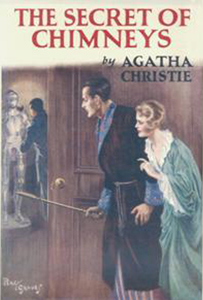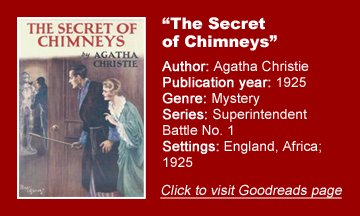“The Secret of Chimneys” (1925) is the first Superintendent Battle book, but novel and character are nothing alike in demeanor. Battle is a man of few words and even fewer expressed emotions; Mark Twain would like him. When he does speak, you know he’s worth listening to.
But Agatha Christie’s overall yarn resists measured, detached detective work. The question of who killed a foreign prince at a British country estate is complex (no surprise there) and (more surprising) Scotland Yard’s Battle finds himself amid a vast, colorful array of suspects.
Battle not the main character
Battle isn’t close to being the main character. That would be Anthony Cade, with whom Christie pulls off an impressive trick. We spend more time with him than anyone, but we never totally know him until the final pages; it seems he’s keeping something in reserve, and indeed he admits as much.
This is even beyond the fact that he starts the story by posing as his friend, Jimmy McGrath, intending to deliver a deceased Herzoslovakian ruler’s memoirs to a London publisher.
Thankfully, he drops that ruse fairly quickly, so I didn’t have to keep reminding myself “OK, so ‘McGrath’ is really Cade.” In an even more welcome shift after the first few chapters, Christie switches from a rather dour, stiff mood to a funny and jovial one.
Virginia Revel kicks off the change: She’s a young widower who craves adventure – so much so that when a man comes to blackmail her with a packet of letters that he assumes she wants back (since they’re signed with her name), she pays him off … even though the letters are not hers.
Despite being a member of the idle rich, Virginia is a delightful person to follow. The author has a knack for smirking at societal positions and strictures, both from within the characters themselves and as an observer. Also providing smiles for the reader are:
- statesman Lomax, a verbose talker who has learned to grab people by the elbow so they can’t escape;
- Lomax’s assistant Bill, who is fumblingly in love with Virginia;
- Chimneys Lord Caterham, who finds hosting an impromptu murder party exhausting;
- and Caterham’s daughter, with the wonderfully unlikely name of Bundle, who honestly could go for spots of murder, theft and intrigue to spice up her life.
Murder as entertainment
“Chimneys’ ” cast goes even deeper than that, but Christie eases our burden by drawing everyone so distinctly. The titular location is also a character, with secret passageways. And somewhere on the grounds is a priceless piece of jewelry sought by multiple parties.
But even as she popularizes the rules of the mystery-novel game, Christie has fun with it; in a way, she’s like Bundle, seeing this as entertainment. In another way, she’s the outside observer of Bundle, delighting in the incongruent – and certainly improper – fact that murder can play as entertainment to some people.
Meanwhile, the plotting is quite good. As with the first Tommy and Tuppence book, “The Secret Adversary,” Christie introduces international finance and politics. The setting is almost exclusively Chimneys, but the stakes are believably worldwide, as various power players vie for oil concessions in Herzoslovakia.
Again, I’m struck by the notion that some things don’t change throughout history, but perhaps Christie should get credit for teasing out motives that still ring true a century later.
1925 time capsule
“Chimneys” is very much a slice of 1925 in other ways, including a late jibe about how surely world-traveler Cade isn’t going to marry a black African woman. No, of course he isn’t; don’t be absurd. He’s going to marry a proper white gentlewoman.
I was also struck by one character’s totally straight defense of monarchy as a system of government; Christie is a smart woman, so she (through the character) doesn’t simply praise monarchy because it’s what she knows. Instead, she gives a robust argument of how humanity is not ready for democracy and probably won’t be for several more centuries, so monarchy is the ideal system in the meantime.
It’s surprising that another character doesn’t give a counter-argument for democracy and/or individual freedom, but also kind of refreshing to hear an unpopular (and by today’s terminology, un-PC) view stated so bluntly.
But overall, “The Secret of Chimneys” stands the test of time. It’s a well-plotted mystery, but I love this book more for how it’s a blast of personalities bouncing off one another.
Even if he is the detective assigned to the case, Battle is a minor player, and a staid one. But I ended up liking even him, and relating to him: He stands to the side and observes. Faced with the lively bunch at Chimneys, that’s all you could ask of anyone.
Every week, Sleuthing Sunday reviews an Agatha Christie book or adaptation. Click here to visit our Agatha Christie Zone.



